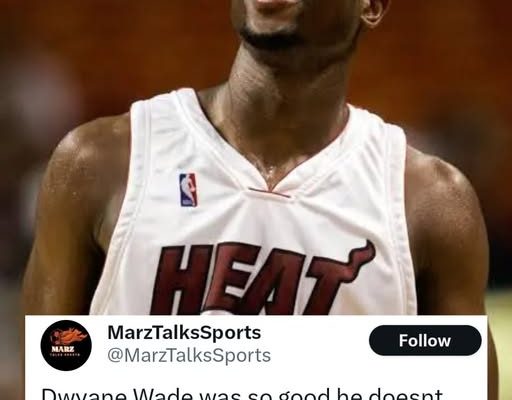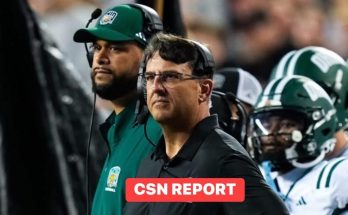There are some names in the history of basketball that generate instant recognition—Jordan, LeBron, Kobe, Magic, Kareem, Bird. But there’s another name that, while not always shouted from the rooftops with the same volume, should sit comfortably among them: Dwyane Wade. Nicknamed “Flash,” Wade’s career was a testament to consistency, grit, unrelenting athleticism, and leadership. And yet, in many discussions about the greatest players in NBA history, his name floats beneath the surface, quietly overlooked or relegated to a second-tier of stardom. But the reality is, Dwyane Wade is low-key one of the best players to ever set foot on a basketball court.
From the moment Wade was drafted fifth overall in the 2003 NBA Draft—part of arguably the greatest draft class in league history alongside LeBron James, Carmelo Anthony, and Chris Bosh—he showed signs of something different. He didn’t have LeBron’s otherworldly physical frame or Carmelo’s silky scoring game, but what Wade had was a fire that translated to immediate results. In his rookie season, Wade led the Miami Heat to the playoffs and quickly made his presence felt with clutch shots, fearless drives, and a level of maturity that exceeded expectations. By his third season, Wade had already won an NBA championship—something neither LeBron nor Carmelo could claim at the time. And he did it in spectacular fashion.
The 2006 NBA Finals remain one of the most iconic series in league history, primarily because of Wade’s performance. Down 0–2 to the Dallas Mavericks and facing elimination, Wade turned into an unstoppable force, averaging 34.7 points, 7.8 rebounds, 3.8 assists, and 2.7 steals per game over the six-game series. He won Finals MVP and carried a team that, outside of Shaquille O’Neal in the twilight of his career, had no other Hall of Fame-level talent. What Wade accomplished during that series wasn’t just remarkable—it was historical. Only a handful of players in NBA history have taken over a Finals series so completely, and Wade was just 24 years old.
Wade’s athleticism was unmatched during the peak of his career. His quick first step, devastating crossover, and contortionist-level finishes around the rim made him one of the most difficult covers in the league. But beyond the highlight plays, Wade was always about substance. He was a two-way player long before it became fashionable to discuss “two-way stars.” He holds the all-time record for blocks by a guard—a testament to his timing, effort, and basketball IQ. At just 6’4″, Wade wasn’t supposed to be a shot-blocking threat, yet he turned it into an art form. Whether it was meeting big men at the rim or chasing down wings in transition, he was a defensive menace when it mattered most.
What often goes underappreciated is how Wade adapted his game throughout his career. Early on, he was the alpha—a lead scorer, facilitator, and tone-setter for Miami. But when LeBron James and Chris Bosh joined him in 2010 to form the “Big Three,” Wade did something many superstars are unwilling to do: he took a step back. He made room for LeBron to lead while still delivering All-NBA caliber performances. This sacrifice led to four straight Finals appearances and two more championships in 2012 and 2013. The Heat don’t become a dynasty without Wade’s humility and team-first mentality.
Even when injuries began to chip away at his explosive athleticism in the later stages of his career, Wade found new ways to contribute. He developed a strong mid-range game, relied more on his savvy and footwork, and continued to be a clutch presence in big moments. His basketball IQ—never dependent solely on speed—shone through even more as he aged. He served as a mentor to younger players, a steadying presence in the locker room, and a franchise cornerstone until his final season.
Wade’s resume speaks volumes. Thirteen-time All-Star. Eight-time All-NBA. Three-time NBA champion. One-time scoring champion. NBA Finals MVP. Olympic gold medalist. Over 23,000 career points, 5,000 assists, 4,000 rebounds, and 800 blocks. These numbers aren’t just good—they’re all-time great. And yet, despite these accomplishments, Wade rarely finds himself mentioned in the top five or even top ten player debates. This is where the “low-key” part of his legacy becomes frustratingly apparent.
Part of the reason Wade gets overlooked is the market he played in. Miami, while glamorous, doesn’t have the media draw of a Los Angeles or New York. His career never had the soap-opera drama of some contemporaries, and he wasn’t as active in self-promotion during his peak years. Wade let his game speak for itself, and in today’s hyper-saturated media environment, that can sometimes result in diminished spotlight. He wasn’t chasing headlines—he was chasing greatness.



